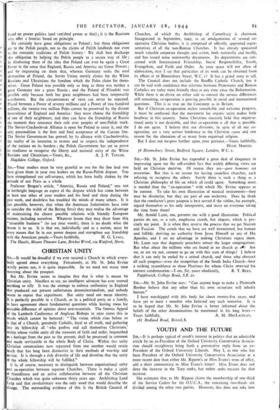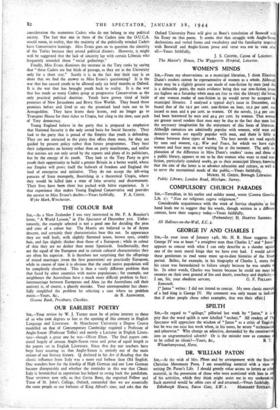YOUTH AND THE FUTURE
Sus,—It is perhaps typical of youth's interest in politics that an admirable article by an ex-President of the Oxford University Conservative Associa- tion should straightway bring forth a provocative reply from an ex- President of the Oxford University Liberals. May I, as one who has been President of the Oxford University Conservative Association at a more recent date than either Mr. Rippon's or Miss Evans's term of office, add a short commentary to Miss Evans's letter? Miss Evans does not deny the increase in the Tory ranks, but rather seeks excuses for that increase.
She estimates that, as Mr. Rippon claims the membership of one-third of the Service Cadets for the O.U.C.A., the remaining two-thirds are dividql among the other two parties. However, this does not take into consideration the numerous Cadets who do not belong to any political society. The fact that one in three of the Cadets join the O.U.C.A. would mean, in reality, that the majority of the politically minded Cadets have Conservative leanings. Miss Evans goes on to question the sincerity of the Tories because they attend political dinners. However, it might well be suggested that the lack of sincerity lay with certain Liberals who frequently attended those " social gatherings."
Finally, Miss Evans dismisses the increase in the Tory ranks by saying that " these Cadets are but birds of passage, as they are at the University only for a short stay." Surely it is in the fact that' their stay is so short that we find the answer to Miss Evans's questioning? It is the war that has caused youth to be allowed only six brief months at Oxford. It is the war that has brought youth back to reality. It is the war that has made so many Cadets grasp at progressive Conservatism as the only practical political doctrine. Youth have grown tired of facile promises of New Jerusalems and Brave New Worlds. They heard those promises before and lived to see the promised land turn out to be Armageddon. They have learnt their lesson, and no longer go to Transport House for their ticket to Utopia, but cling to the slow, sure path of Tory democracy.
Young England believe in the party that is prepared to emphasise that National Security is the only sound basis for Social Security. They look to the party that is proud of the Empire that youth is defending. They are not attracted to the party that offers them most, for they are guided by present policy rather than future programmes. They base their judgements on history rather than on party manifestoes, and realise that nations are not only saved by the reports and plans of its politicians, but by the energy of its youth. They look to the Tory Party to give youth their opportunity to build a greater Britain in a better world, where our Empire will prove itself the bulwark of freedom and England the land of enterprise and initiative. They do not accept the left-wing panacea of State monopoly, flourishing in a theoretical Utopia, where they would be lulled into a state of false security and disarmament. Their lives have been short but packed with bitter experience. It is that experience that makes Young England Conservative and provides
the answer to Miss Evans's doubts.—Yours faithfully, P. A. CUFFE. Wyke Mark, Winchester.



























 Previous page
Previous page